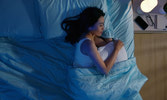Did you know that individuals living in Alberta, Canada are the least sound sleepers and majority of them wake up earlier than intended? Getting quality sleep is important for our overall physical and mental health and light exposure could be affecting the quality of your sleep. Continue reading to find out more about why it’s important to limit light exposure before bedtime.
Circadian Rhythms
Your circadian rhythm is your body’s internal clock that tells you when to be awake and when to rest. Your exposure to light can have a major impact on your circadian rhythm. Natural light and artificial light can affect the circadian rhythm and your body will adjust to whatever it gets the most exposure to. If you're only getting exposure to natural light your body will synchronize with the sunrise and sunset. When you are getting exposure to bright lights and artificial lights right before bed can affect your body’s internal clock by thinking it’s time to stay awake and you will have a hard time falling asleep.
Melatonin Production
Your body naturally produces the hormone melatonin, and its production can also be affected by light exposure. When you are exposed to bright light before bed it alters your melatonin production glands, and you will not produce any melatonin because your body thinks that it is time to be awake. This will make it very difficult to fall asleep and will affect the quality of your sleep.
Which Type of Light Affects Our Sleep the Most?
Any light has an impact on our sleep, but some types of light have more of an impact on our sleep than others. Direct sunlight during the day has the most impact because it is the strongest form of light and will have a large impact on your circadian rhythms and melatonin production. Blue light is a form of artificial light that has a large impact on our sleep. Blue light can come from our phones, laptops, and many other electronic devices.
What Can You Do?
Making your sleep environment as dark as possible will help improve the quality of your sleep. You can do this by using blackout curtains to help with keeping most of the light out. It is also a good idea to dim the lights in your room as it gets closer to bedtime. Use a lamp or some sort of dimmed lighting to let your body know that it is almost time for bed. Another way to promote better sleep is to avoid electronics right before bedtime. You could try setting a timer to let yourself know that it is time to shut off the screens or keeping electronics completely out of the bedroom would be very helpful.
Exposure to light can have a large effect on our quality of sleep, circadian rhythms, and our melatonin production. When you aren’t getting enough sleep, you will see the effects in your day-to-day life. It can affect your mood, your work, relationships, and many other aspects of your life. Prioritize your sleep today and try to limit your exposure to light before bedtime to promote quality sleep!


